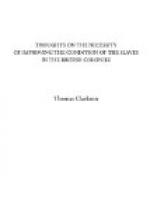A second case may be taken from what occurred at the close of the second, or last American war. It may be remembered that a large British naval force, having on board a powerful land force, sailed in the year 1814, to make a descent on the coast of the southern States of America. The British army, when landed, marched to Washington, and burnt most of its public buildings. It was engaged also at different times with the American army in the field. During these expeditions, some hundreds of slaves in these parts joined the British standard by invitation. When the campaign was over, the same difficulty occurred about disposing of these as in the former case. It was determined at length to ship them to Trinidad as free labourers. But here, that is, at Trinidad, an objection was started against receiving them, but on a different ground from that which had been started in the similar case in Nova Scotia. The planters of Trinidad were sure that no free Negroes would ever work, and therefore that the slaves in question would, if made free and settled among them, support themselves by plunder. Sir Ralph Woodford, however, the governor of the island, resisted the outcry of these prejudices. He received them into the island, and settled them where he supposed the experiment would be most safely made. The result has shown his discernment. These very men, formerly slaves in the Southern States of America and afterwards emancipated in a body at Trinidad, are now earning their own livelihood, and with so much industry and good conduct that the calumnies originally spread against them have entirely died away.
A third case may comprehend those Negroes, who lately formed what we call our West Indian black regiments. Some of these had been originally purchased in Africa, not as slaves but recruits, and others in Jamaica and elsewhere. They had all served as soldiers in the West Indies. At length certain of these regiments were transported to Sierra Leone and disbanded there, and the individuals composing them received




